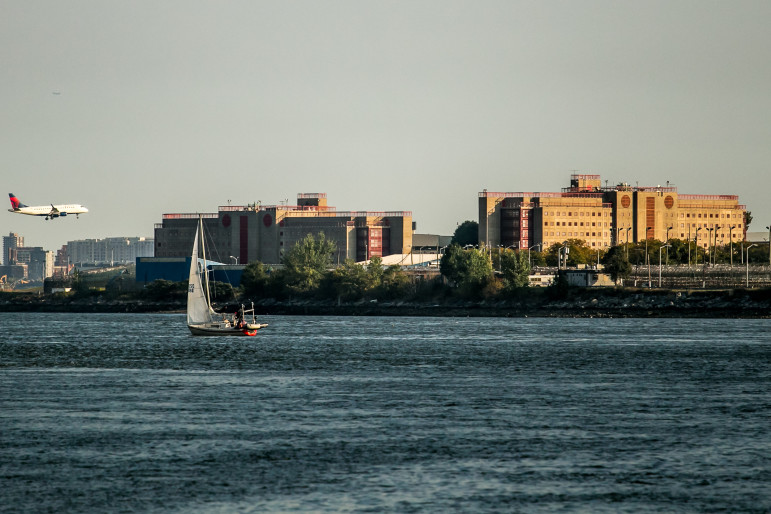
Adi Talwar
George R. Vierno Center on Rikers Island, seen from the Bronx.
Read the original story in Spanish at El Diario
Translated and condensed by Carlos Rodríguez Martorell
Nora (not her real name) is convinced that her 35-year-old son, who is awaiting sentence for a misdemeanor, will be long gone from Rikers Island by the time the jail closes in 2026. For the last eight months the Bronx resident, who came to New York from Puerto Rico’s coffee-growing region 27 years ago, has been traveling to the penitentiary three times per week.
“I do not abandon my boy. I am bringing four newspapers for him to read. He is in an area where there have been brawls, but he has not been harmed. Every time I come to visit him, I check him thoroughly because I sometimes think he is hiding something from me so I don’t get worried,” she said as she waited for the free bus that takes visitors to Rikers from Harlem.
Dominican-born Lucy, 45 and also a Bronx resident, is taking the free bus as well. Her husband has been incarcerated for nine months “for killing a young man in self defense in Washington Heights,” she says.
“I would like to come every single time I am allowed to per week. [But] I am alone in this, and paying for a lawyer has put me into years-long debt. If I don’t work, I have less money to help him,” said Lucy, in tears, who said her husband has been subject to violence and other issues at the troubled jail complex. “On the third month, they hit him in the head. This past summer, he almost suffocated during the heat wave. It is terrible. It’s all about money. I am also in prison in some way.”
[optin-monster-shortcode id=”mgdxaus9n1d39gfbzqwj”]
El Diario accompanied both women from Manhattan to Rikers Island. Most people on the bus were Hispanic, and women. The Department of Corrections provides the free bus service several times per week, leaving from Harlem and Downtown Brooklyn.
“Here you pay for being poor,” said Nora. “You see in court that a murderer pays bail and is free to go, while my son has been jailed for months for some silly thing – for being in the wrong place at the wrong time, and for not being white.”
She is celebrating the closing of Rikers, as well as the fact that families will have the chance to have jailed relatives closer to their neighborhoods, and that more humane prisons will be built. Still, she says, “that is not the real solution.”
“As long as the system continues to criminalize Latinos for little things, it will all remain the same. The process is slow. My son’s trial has been suspended three times for lack of a district attorney. I have sat waiting in court for up to four hours only to be told at the last minute that the session is suspended,” she said.








